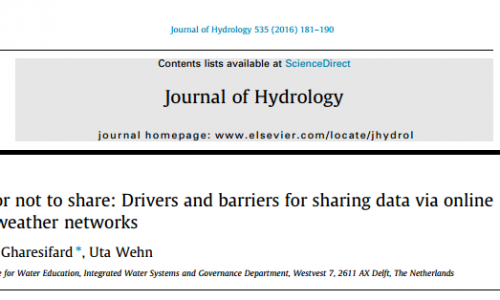To share or not to share
Drivers and barriers for sharing data via online amateur weather networks
Increasing attention is being paid to the importance and potential of crowd-sourced data to complement current environmental data-streams (i.e. in-situ observations and RS data). In parallel, the diffusion of Information Communication Technologies (ICTs) that are interactive and easy to use have provided a way forward in facing extreme climatic events and the threatening hazards resulting from those. The combination of these two trends is referred to as ICT-enabled ‘citizen observatories’ of the environment.
Nevertheless, the success of these citizen observatories hinges on the continued involvement of citizens as central actors of these initiatives. Developing strategies to (further) engage citizens requires in-depth understanding of the behavioral determinants that encourage or impede individuals to collect and share environment-related data.
This paper takes the case of citizen-sensed weather data using Personal Weather Stations (PWSs) and looks at the drivers and barriers for sharing such data via online amateur weather networks. This is done employing a behavioral science lens that considers data sharing a decision and systematically investigates the influential factors that affect this decision. The analysis and findings are based on qualitative empirical research carried out in the Netherlands, United Kingdom and Italy. Subsequently, a model was developed that depicts the main drivers and barriers for citizen participation in weather observatories. This resulting model can be utilized as a tool to develop strategies for further enhancing ICT-enabled citizen participation in climatic observations and, consequently, in environmental management.
This article is written by M. Gharesifard and U. Wehn and was published in the Journal of Hydrology, Vol. 535, April 2016.
Read the full article here.

